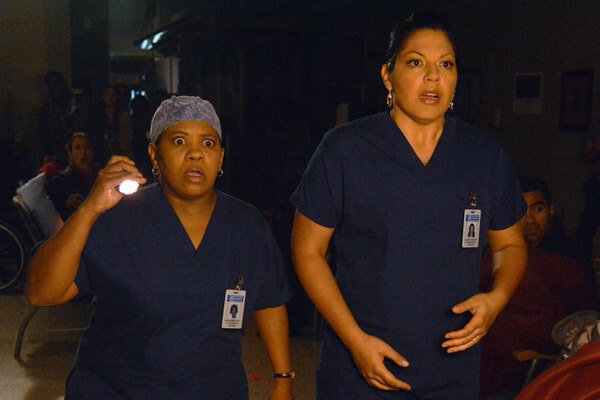I spent the majority of my freshman year sick. Even my most valiant efforts to thwart colds, strep throat, stomach flu and even the dreaded mono were all for naught. Why is it so easy to get sick in college?
Even though you feel grown up, in reality, college is a lot like kindergarten. All the kids are thrown together—except this time in crowded basement parties and lecture halls versus the playground. You’re exposed to new people, places and, of course, illnesses. This may seem like a recipe for inevitable disaster, but hope is not lost. To keep yourself alive and well, heed this list.
1. Call a Doctor.

The longer you wait to get medical attention, the worse it can get. Disease doesn't care about convenience—midterm or not—you need to tell your symptoms to an expert as soon as possible. Hopefully you’re not as sick as that Google search led you to believe, but if you are, you’ll be glad you caught that conjunctivitis, strep, sinus infection, etc., at first signs.
2. Wash your hands.

Back to kindergarten again, I know, but hand washing will protect you from getting sick. Think about how many students touch the handle of your communal bathroom door, the computer keyboard in the library lab, or the dining hall table where you just ate your dinner…gross.
3. Sleep. Seriously.

When you have a weeknight when you're not slammed with work, don't stay up until 4 a.m. Snapchatting pictures of your face to your roommate who is lying next to you. Go to sleep. Dr. Elizabeth Byrne says, “Sleep deprivation leads to significant cognitive risks in performance in anything from your classes to driving.” And if that doesn’t convince you, consider the physical risks. Byrne adds, “Sleeping less than seven hours a night can also affect your metabolism. Studies have shown that getting less sleep leads to weight gain.”
4. Don't drink…too much.

You may feel like your hangover lasts only a few hours, but in reality, excessive drinking can leave you with a lot more than a bad morning. Audrey Walters, a nurse at Chris Evert Children’s Hospital explains, “Binge drinking and drug use serve as major stressors, which weaken your immune system. With a weakened immune system, your body cannot fight off viral or bacterial infections as well as a healthy immune system, making you much more susceptible to illness.”
5. Watch Netflix all day.

Now I have your attention. Of course I don't mean this literally, but if you're not feeling well, go for it. Stay home, kick back and relax. Nursing student Mairin Breslin says, "You start feeling under the weather because your immune system isn't as strong, and this usually happens when you're run down. The best thing you can do is drink fluids and rest.” Plus, no one wants you in class spreading the germs.
6. Don't be a giver.

We know you want to make friends, but you don't need to share your drinks, lip-gloss, hairbrush, saliva (you know how) and, ultimately, germs, with them. You don't want to be known as "the one who gave me mono."
7. Conversely, don't be a taker.

Although you might be smart enough not to offer someone a sip of your water while you're sick, not everyone is so considerate. Avoid drinking out of other people's cups (i.e.: drink out of your OWN PONG CUP, PEOPLE) and generally putting your mouth where the mouths of others have been (this includes that guy you saw making out with another girl five minutes ago).
8. Be hygienic.

Another piece of seemingly obvious advice, but nursing student Breslin says, "I think the world would be surprised to know that some people don't shower every day. Many times people will go to the gym or run errands all day without going home to shower or, dare I say it, change underwear. If there's one thing I learned in microbiology class, it's that microorganisms LOVE warm, dark places…need I say more?" She also adds: "Wear flip flops into the shower and wash your bed sheets at least twice a month." Don't neglect the bed sheets. That's just nasty.
9. Take vitamins.

Despite my best advice about food, you’re probably not going to eat a perfectly balanced diet at the dining hall. Nurse Audrey Walters recommends “a multivitamin a day to help fill the gaps in your collegiate diet. When selecting you supplement, pick the one that has no more than the recommended daily value. It is important to note that taking too many vitamins can have negative effects such as nausea and diarrhea.”
10. Don't eat sh*t.

You know what I'm talking about. A greasy late night pizza topped with curly fries and ranch dressing is acceptable once in a while, but if you make that Friday night Chinese take-out a habit, it's going to catch up to more than just your thighs. Try to eat everything in moderation. Don't live off almonds and Acai juice, but don't eat 3,000 calories worth of fried deliciousness every night of every weekend either. Find a balance, and your body will thank you.
Here’s a bonus: If you follow these suggestions and STILL get sick, CampusMD is a great solution. CampusMD offers students 24/7/365 access to a nationwide network of Board-certified doctors by phone or online chat. CampusMD doctors treat you as they would during an in-person visit: they ask questions, diagnose and treat what ails you. Even if it’s 2 a.m. on Saturday, you can reach a CampusMD doctor. Talk about making life easy.



















